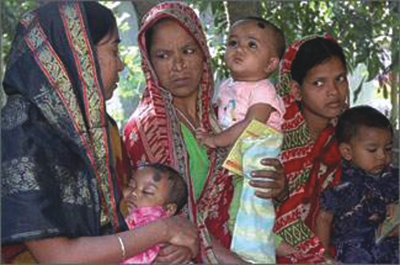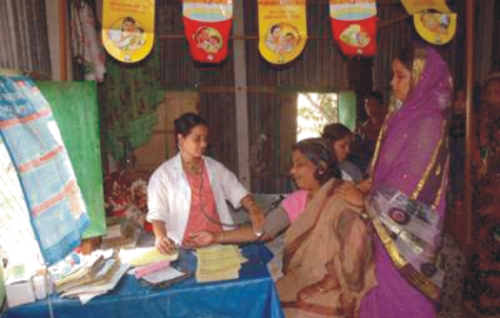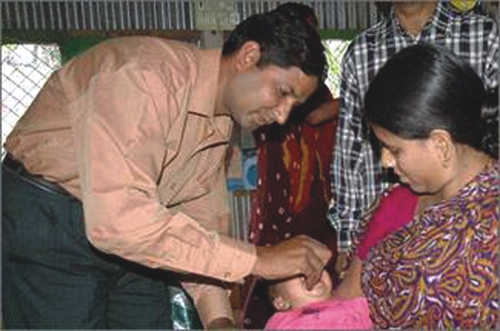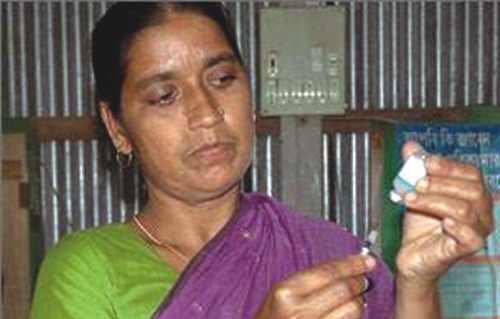|
Special Feature
World Health Day 2006
Working Together for Health
World Health Day is the annual flagship event of the World Health Organization (WHO). Since 1950, it has been observed on April 7 each year to raise awareness of specific global health issues. This year's theme 'Working together for health' highlights the challenging and inspiring work carried out by health care workers.
Tareq Salahuddin

The health of Bangladeshis has improved significantly over the last three decades, but many challenges remain. One in 59 women dies in pregnancy or childbirth in her lifetime, and more than five in every 100 babies die before they are 28 days old. Almost half of the children in the country are malnourished. Tuberculosis is common, and malaria is endemic in many parts of the country. In rural areas, 'health assistants' provide primary health care, and 'family welfare assistants' provide family planning services. These people are responsible for duties typically carried out by nurses in urban areas of the country. One health assistant and one family welfare assistant provide health care to about 5000 people through satellite clinics, outreach immunisation centres, and household visits in the community. Once or twice a month, villagers volunteer the use of their homes to be used as satellite clinics. At these clinics, the health workers treat people for diseases such as diarrhoea, respiratory infections, anaemia and intestinal worms. They also provide information and advice on family planning, sanitation, nutrition, immunisation, pregnancy and childbirth, HIV/AIDS, tuberculosis, malaria and leprosy.
Why focus on the health workforce? Health workers save lives. Without them, advances in health care cannot reach those who need it most. Preventing and treating diseases require assessment, delivery and monitoring by health workers. Despite this, national health systems worldwide are finding it increasingly difficult to train, support and retain their health workers. These problems are directly threatening global efforts to achieve the Millennium Development Goals (MDGs) and to deal with dire health threats. In addition, shortages of health educators and trainers, support staff and managers, and the wasting of available resources are making a critical situation even worse.

The health care worker plays an important role in motivating people to come to the centres for checkups
World Health Day 2006 and the world health report 2006 have all been aligned around the key theme of 'Working together for health'. The hope is that this will encourage all stakeholders policy makers, international donors, politicians, health professionals, academia, civil society, faith-based organisations, media to unite and work together to strengthen the health workforce. The four priorities for action encompass educating and training health workers; supporting and protecting them; enhancing their effectiveness; and tackling health imbalances and inequities.
Heroes for health
The 'heroes for health' are working in difficult conditions with limited financial compensation and exposing themselves to the risk of getting infected by various diseases. They work under many constraints. For example, they often have to walk miles since rickshaw fare may prove to be too costly. They often have to work in severe heat and humidity braving rain and storm to reach their patients. Sometimes they have to convince reluctant parents to bring their children for immunisation or persuade poor husbands to take their pregnant wives for checkup. Many elderly persons still refuse to allow their sons or daughters take up family planning and it is the health worker who has to motivate them to change their minds. Certain social and religious beliefs still work in them with regard to adopting family planning methods. Having a child in the first year of marriage is still considered an achievement in the rural male community. If a newly married woman delays pregnancy, community members begin to consider her infertile (sterile). Health workers, such as Health Assistants, Assistant Health Inspectors, Health Inspectors, Family Welfare Assistants and some irregular workers like porters take up the challenge and manage to convince the people about the benefits of primary health care and family planning; they organise motivational programmes with the community people and inform them about the free services available.
Working for health in Kumuli village, Bangladesh
A dynamic team of health workers is serving the people of Kumuli, a small village in Nababganj, northern Bangladesh. The team consists of Health Assistant, Tipu Sultan, Family Welfare Assistant, Sanwara, Family Welfare Assistant, Bina, Assistant Health Inspector, Niranjon Balo, Health Inspector, Sushen Chandra Balo and Porter, Abul Kashem.
The team members walk to and from their workplace everyday. Some of them may have to walk about 5 kilometers to and from their residence on the day satellite clinic is held. They often have to cross one or two rivers to reach the destination. In the interior of the villages, roads are not brick-soled and during monsoon time these become extremely muddy. There are no bridges on small canals. They have to cross them by boats.
The team's job is to motivate the community people to seek primary health care services when they come to the satellite clinic. Sometimes they visit their homes to deliver certain information. At the moment they are going around meeting the villagers to tell them that a measles campaign will start from February 25 and continue till March 16 for children aged 9 months to 10 years. These dedicated workers are also doing their best to help arsenic mitigation. They create awareness and convince people not to use arsenic-contaminated water from tube wells marked with red colour. People are advised to collect drinking and cooking water from safe tube wells marked green. The arsenic is seeping into the ground water table and contaminating water of tube wells. This is a natural contamination process in some areas of Bangladesh, as well as some of the region. The Department of Public Health Engineering (DPHE) carries out tests and marks such tube wells with red paint, while the safe ones are painted green.

Health care workers are crucial in making immunisation programmes successful
Family Welfare Assistant Sanwara Begum (37) lives in a village next to Kumuli. She has been working in the health and family welfare sector for the last 20 years after receiving training from the Department of Family Planning. She is still working as a staff under the development fund of the government, like all the other FWAs. Since joining the service Sanwara took her responsibilities seriously. In the early years her salary was also quite minimal but this did not curb her enthusiasm for her work. She has gained acceptance from the community through hard work and sincerity. She said that those days are over when people used to get angry seeing her talking to their wives or married sisters about family planning. That was about fifteen, twenty years ago. "We used to get chased away by the family elders, mostly men, if they saw us talking with the female members of the family. But things are better now." She said. "If not all, many of the eligible couples in our union are now having a planned family by using adopting family planning methods." Sanwara says that they have realised that too many children bring unhappiness and poverty in the family. "I often tell them that I have taken only one child and yet I am happy" says Sanwara. "It does not matter that I have a daughter. If she becomes educated she will look after us when we shall get old. But at the same time, this is also true that many couples, especially men, are not coming forward to practice family planning. This is where we are facing social barrier. Ignorance, fear of orthodox parents, fear of some orthodox religious leaders, false fear of falling sick after using FP methods like pills are some of the reasons these couples are not using FP methods. We are talking with the community leaders in this regard but a lot more need to be done." She adds. She feels proud to do such important social and health development work though she has to often face resource constraints, such as having no money to pay for a rickshaw or boat ride to meet a sick villager.

The 'heroes for health' work under difficult conditions with limited financial compensation
Government health care services are free of charge and yet because of lack of education and awareness some villagers show reluctance to come forwards to seek the services. Sanwara's prime responsibility is family planning. She distributes family planning commodities, such as oral contraceptive pills, condoms etc., among the willing couples. The government supplies these commodities free of cost. She visits the houses of the villagers and counsels them and carries out necessary follow-up. Sanwara feels that she could have done better if she had further training on health and family planning and had job security with incentives. Yet, serving the community members and getting their recognition and appreciation is the main motivational factor. Sanwara's husband Mujibur Rahman worked as a teacher in a high school in a village nearby for the last 12 years. Because of some pressing family needs, he gave up teaching and went off to Malaysia taking a job in a hotel as a store assistant in the Food and Beverage department. After staying there for two years recently he has come back and gone into agricultural work and fish farming. They maintain the family jointly. Sanwara's husband is happy with the work she is doing. She helps in the household works after returning home. They have a 17-year-old daughter who studies in a college in Nababganj proper. They want her to select a good career after graduation.
Key messages for World Health Day 2006
Educated and well-trained health workers save lives They are vital for providing access to disease prevention, treatment and care for all, including those living in extreme poverty.
Support and protect health workers Safe and supportive working conditions must be ensured, and salaries, resources and management structures improved.
Enhance the effectiveness of the health workforce through new strategies Enormous opportunities to achieve efficiency gains exist in many settings, and strategies must focus on the existing workforce because of the time lag in recruiting or training new health workers.

With patience and sincerity the health care workers have gained the
trust and respect of the community
Tackle imbalances and inequities There are now widening imbalances and inequities in the availability and migration of health workers that seriously undermine the provision of fair and universal health care. Governments must take the lead To make progress in all the above areas, governments must provide leadership in planning, formulating and implementing the required policies.
Promote partnership and cooperation Alliances of stakeholders within countries backed by global and regional reinforcement are needed to properly address the technical and political challenges of health workforce development.
Build trust among all stakeholders Trust between governments, employers, health professionals and the communities they serve must be nurtured and maintained.
Copyright
(R) thedailystar.net 2005 |
